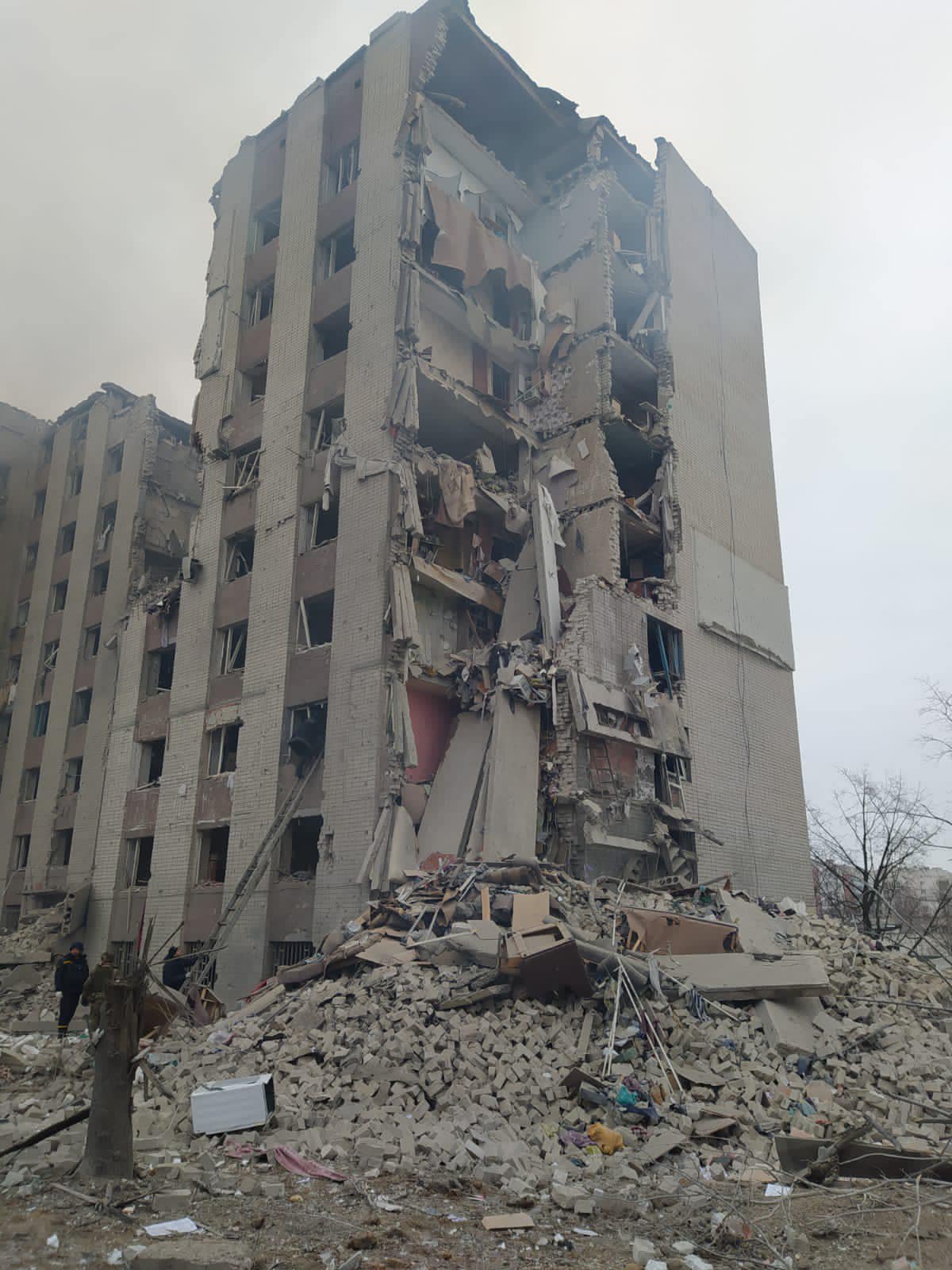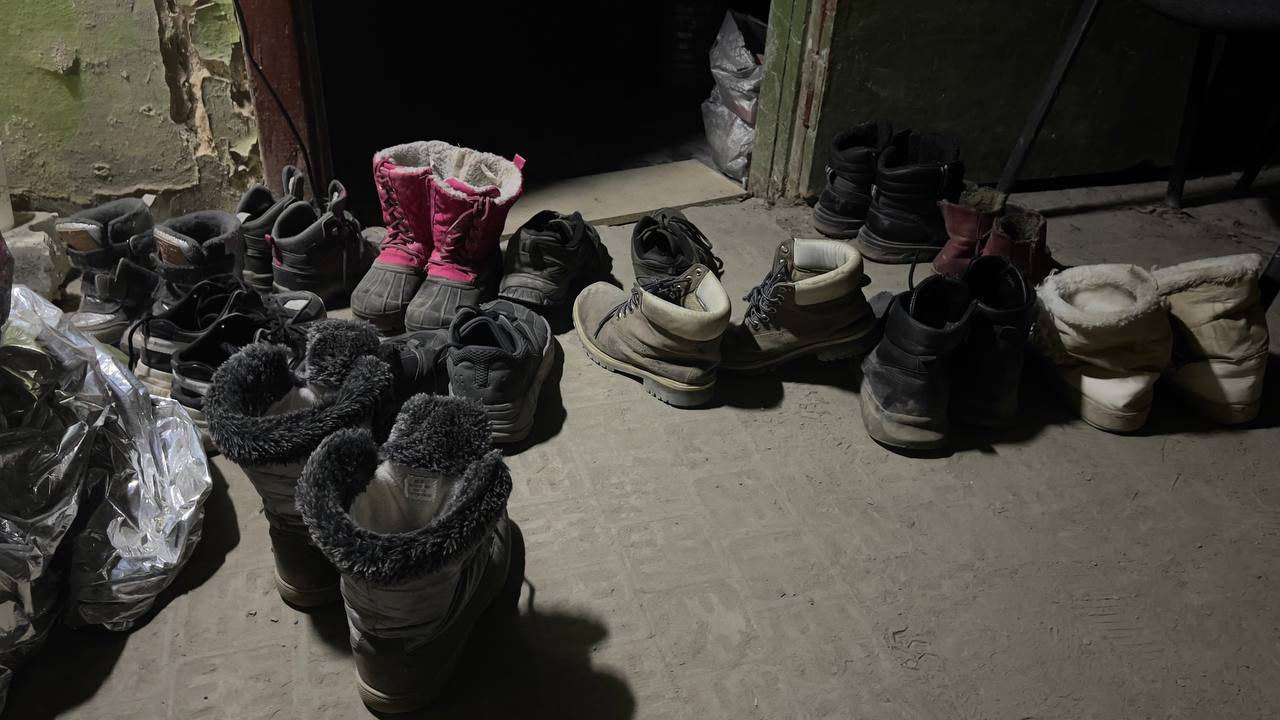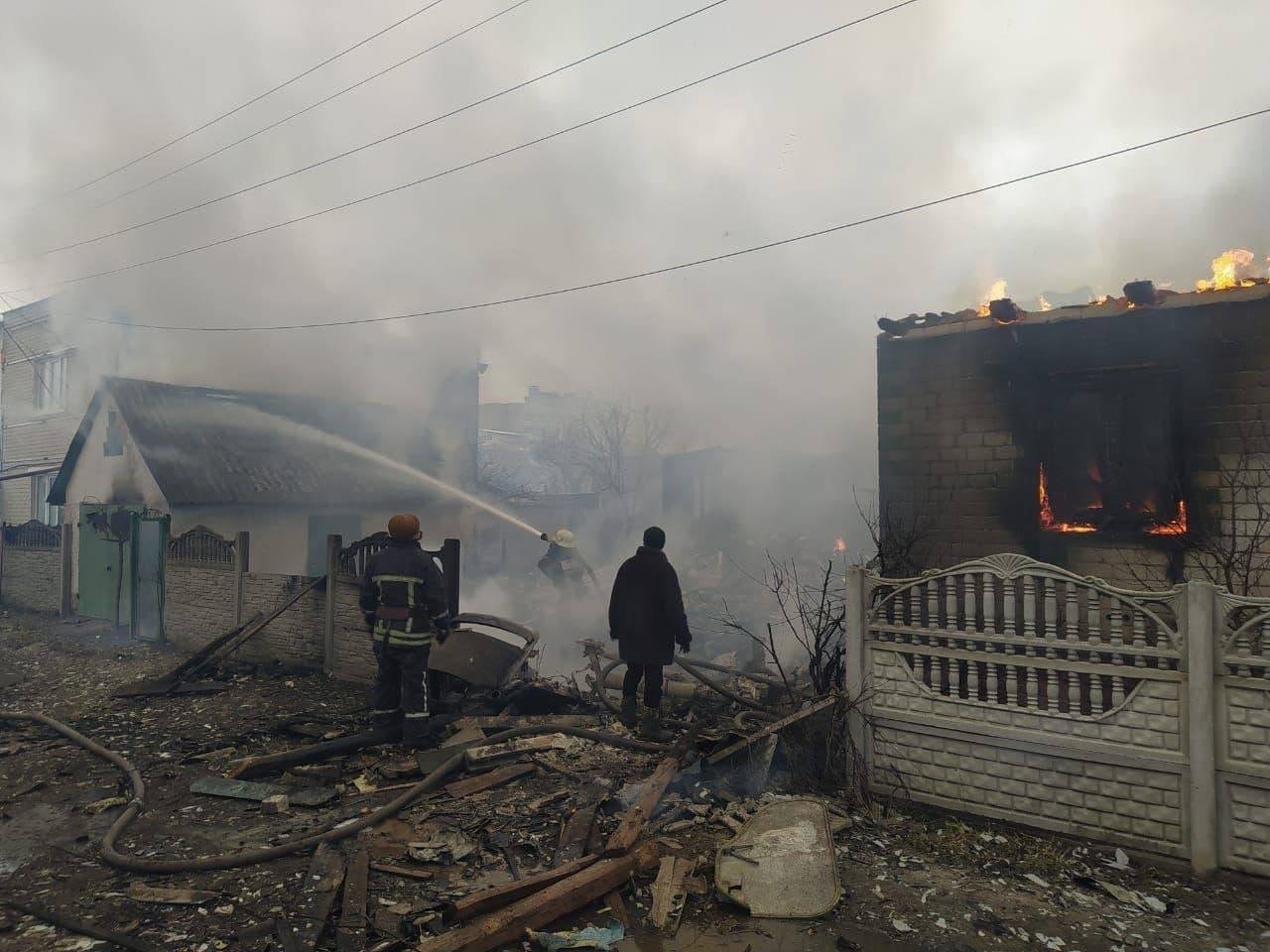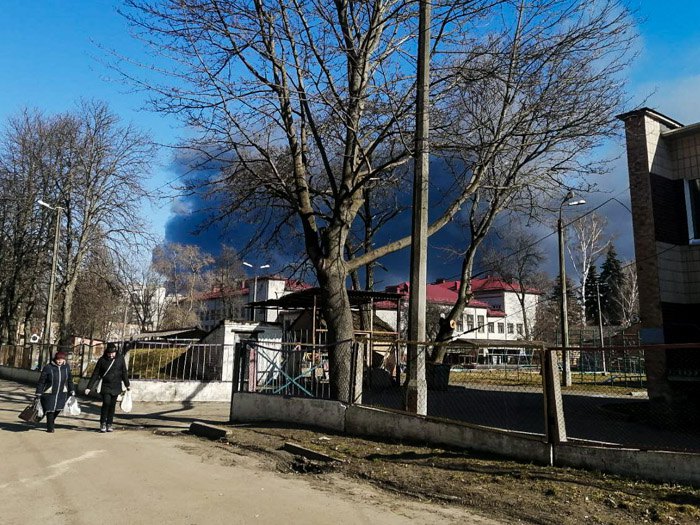
1.
If there were more photographers in Chernihiv, more people would know that the city turned into ruins. Not the whole city, not everywhere, but the suburbs and some districts have been destroyed. If up till now, people used to tell each other about shelling in Masany one night, then in Podusivka and ZAZ district the other night, in recent days every district has been shelled.
Since about 10 March, Chernihiv has been covered with thin smoke. It’s not just because of fires. There were bonfires. People were cooking food in their yards. At that time, most people remained without water, heat, power supply, or communication. The best situation was with gas, our apartment was lucky. But not everyone was so lucky.
I say “our apartment” but I do not mean my home. My house was damaged by missile wreckage in the first days. It was when the city outskirts where I live was shelled from the Ripky and Horodnya directions, from where Russian troops were approaching the city. So, I mean the apartment where I was sheltered thereafter. Nowadays, people, losing their homes are wandering with backpacks and sacks further deep into the city, which the Russians are trying to besiege.
I am most impressed by older women. They are still well-dressed with slight make-up.
2.
In the early days, many rushed to the villages around the city, believing that the Russians did not need villages. My friends and acquaintances went to Sedniv in the direction of Horodnya, literally to meet the Russians. Somebody went to Kyinka, right outside Chernihiv, in the direction of Kyiv. Both here and there, the poor people fell into traps. On the fourth day of the war, the Russians fired cluster munitions into Kyinka. There were only walls remaining of many houses, along with the deceased; deceased people and the hope to find any survivors under the rubble. The Russians invaded Sedniv on the evening of the first day. Since then, people have remained in their homes. The food soon began to run out. The Russians looted shops. One family from Sedniv, who was trying to get out of a nearby village by car, was shot dead. Eventually, the shooting of civilian cars ceased to be so unexpected. The same thing occurred in Ivanivka, in a village on the Chernihiv-Kyiv highway. The Russians herded people into cellars and placed their military equipment in their yards. Our connection with the villages quickly disappeared. Yet, we all have friends and relatives there.

3.
I returned to Chernihiv on 3 March. The moment we handed out the last cigarettes and passed the last entrance checkpoint, we were told to drive carefully. The centre had just been shelled. It was about noon.
It was an air raid on a residential area that resulted in several destroyed houses. The death toll was rising by the hour. Eventually, rescuers said that forty-seven people were dead. Not all people were in the house. Many people stood in line for medicine and food, and it was a time when pharmacies and shops opened for a short time. Our acquaintances were in one of the houses. They were saved by load-bearing walls and luck.
The Russians dropped at least eight unguided bombs on a residential area. Whole fragments have been literally broken away from the houses. The survivors moved in with relatives. My friend’s uncle and aunt said that they would board up the windows, fix everything they could and stay there for a little while more. Older people find it difficult to leave their homes. My uncle said that he had served in the Soviet army. When the Russians come to his house, he would like to look them in the eye. Maybe he would recognize somebody.
Of course, there were no military facilities around. I’m not sure if the Russians had hit at least a single military facility in the city. Except perhaps, they set fire to the abandoned airport near Chernihiv on the first day, which in any case has been destroyed for the past decade. And a police station. Apart from that, they do just the same as anywhere else: destroy schools, kindergartens, hospitals.
4.
Planes terrify the locals, mostly at night. Wooden planks were cracking in the house as they dropped missiles near us. Wooden Chernihiv is our pride. And our horror.
The outskirts of Chernihiv – often with one-story buildings – flare up like matches. Bombs demolish houses, leaving bare walls. We saw several photos of an unexploded bomb weighing 500 kilograms. We hoped that when it fell on us, we would not feel anything.
People move about in search of a safer place. Every night reveals that there are fewer and fewer safer places. My acquaintances, who were certain of their safety, remained in house without roofs, with demolished yards, with half the house or the whole house razed to the ground.

5.
The city still announces when large stores will be open. While only the rumors will tell you where the small shops work. Sometimes these rumors are false. Then people stand in line in front of the closed door for half a day, still hoping to get some chicken thighs. Sometimes rumors are true. Thus, in one of the shops nearby, men bought some anchovies. And I, following the rumors, was looking for cigarettes, and found some capelin. One package per customer.
It is dark in the store. There is no light, the windows are curtained. People crowd around the counter, handing out money. Some people, like me, ask about cigarettes. No cigarettes, take the fish, girl. I took it and gave it to a mother with several children. Let her have two packages. Then I shook some candy out of my pocket for the little girls.
6.
The worst night was from the 6th to the 7th of March. First, the connection was lost. Then suddenly the light was out. We went out into the yard to see what was going on. There were no air raid sirens. We were about to return to the house when suddenly a whistle blew over our heads. We rushed to hide behind the door, and a few seconds later there was a bang. My friend’s children were already in the cellar. A friend rushed to the room to get blankets to the cellar.
The door to the house was either open or ajar by the draft, and a strong jolt in my back knocked me to the floor. All I heard was the bang and the sound of broken glass. We were sure it was in our yard. We crawled to the cellar, and while crawling I wrote a message to my husband: “It seems to be ours.” But there was no network, and we knew nothing. At 3 am my jacket was wet with moisture, and I was shivering from the cold. So, I got out of the cellar and lay down on the floor in the hallway. I slept through all the following sirens.
In the morning, we learned that the target was not our house. It was a house on the next street.
We do not sleep waiting for the planes. They make about three raids a night. Strike, strike, strike. Everything is clanging in the house. Cups, plates, glasses, windows. Then the plane recedes, and we go out to see if it was for us. The Russians plagued the city for three nights in a row until our troops shot down several of their planes. After that, we had a few nights when we could sleep.
There were nights when people in villages near the city thought that Chernihiv had been set on fire, like that night the Russians hit the oil depot. We went out into the yard, and the sky was red. We didn't know if the fire was coming towards us. We sat on the porch to wait and waited only for the whistling of mines.
7.
One quiet day, I was lucky enough to take a bicycle and go to Chernihiv. When you are on the bike, it even seems that everything is fine. Here is a pine forest in the middle of the city, where we spent our weekends. For many years, the citizens defended this forest park from the authorities, who wanted to build it up with new blocks of flats. People are now buried in wooden coffins here, because the Yatsevo cemetery is constantly shelled. It is also located on the offensive side.
But then I go deeper into my area. Broken windows, burned apartments, debris, and funnels. There are icons in the windows. People taped windows and placed icons on windowsills. Several such icons lie broken under the houses. Queues are everywhere. Mostly of older people. Here, in this area, the bangs are deafening and not only from air defense systems. Nobody even flinches. I ride along the streets that get ready for street fights and hand out cigarettes at the checkpoints. Cigarettes are very difficult to find. Although there is a rumor about a small shop in the centre where people manage to find everything.
I stopped by a friend’s house. She came down and we hugged. We hadn't seen each other for weeks. I cried for the first time. It was such happiness. She gave me six apples. I offered her cigarettes, but she said she had everything she needed.
Every day we write to each other after each blow: “Are you safe?”. “Safe as can be”. When the connection disappeared, we didn't know anything about each other for two days. That’s not a big deal yet. I have had no information from my parents for a week-long period. And I haven’t heard from my dad for twenty days.
8.
During the day, people go shopping, cook hot food, and go for their retirement pension. My friend got hold of some bread and smoked redfish in an empty shop. There are only some very expensive goods left, ‘elite pasta’, as a saleswoman says. People take them but then leave them at the checkout once they find out the price. But someone will definitely take them.
9.
To leave or not to leave: people are hesitant. When there is no light, heat, or water for more than a day, people look for gasoline, which is no longer available in the city. Then everyone asks the people delivering the food in their minibuses where they got the fuel. Few people care where they got the meat. Then the lights appear for an hour and people stall their engines again. You can still live here. And so it goes every day.
9.
People leave Chernihiv alone and together with volunteers. In the first week, the regional authorities constantly said "for those who are particularly knuckleheads" that all exits from the city are mined and it is dangerous to drive. In fact, it was much safer to drive then than it is now. At that time, neither cars nor people on foot were fired upon. I entered the city despite the calls not to leave and not to enter the city.
Every day, those who leave tell others the safe way. And people go, even though everything changes every hour.

Some decide to go in the direction of the Russian offensive. People would return to the district centres behind Chernihiv if the Russians were there only in transit. There is no shooting there. Many of my friends drove or went there on foot. But today they are afraid of what will happen when the Russians retreat. Some laugh out of their fear. So, there is certainty that the Russians will retreat.
More and more often we learn about civilians being shot. The Russians shot a group of teenage boys in Mokhnatyn. Three of them are dead. I didn't know any of them personally, but I know whose younger brother he was.
On 13 March, my friend and her children packed our things and left, not knowing anything about the road or whether it was still possible to go through. The city is almost besieged, and from time to time the Russians try to close the ring.
We have been lucky.
I am leaving the city for the second time. And I hope to return as soon as possible.







